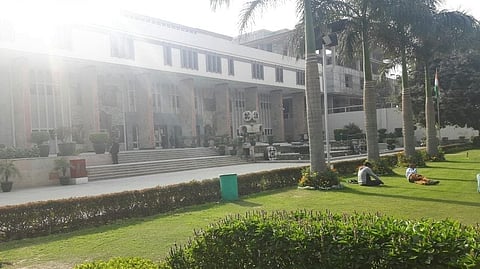
- News
- Columns
- Interviews
- Law Firms
- Apprentice Lawyer
- Legal Jobs
- हिंदी
- ಕನ್ನಡ

Following a reference from a Special CBI Judge under Section 395(2) CrPC, the Delhi High Court will soon consider if an undertrial, who is facing criminal proceedings before different courts, is required to obtain permission for grant of custody parole from all the courts concerned or if any one court of the undertrial’s choice can be moved for seeking custody parole.
In case, permission is not required from the other concerned courts, the Court will answer if the Jail Superintendent or the undertrial/accused is bound to give intimation to the other concerned courts regarding the grant of custody parole.
The Court will also determine the maximum duration in which the custody parole can be granted to an under-trial.
The reference has been accepted by a Division Bench of Justices Manmohan and Sangita Dhingra Sehgal.
The relevant facts of the present reference are that one Sukesh (accused) was in judicial custody with respect to three cases. While two of those were pending at Tis Hazari Courts, the third one was pending at the Rouse Avenue District Court.
The accused moved an application seeking custody parole in one of the cases before the concerned Additional Sessions Judge, Tis Hazari Court. The same was allowed and was later extended from time to time.
After the custody parole granted to the accused came to an end, he moved a bail plea before the High Court seeking extension of custody parole. This was later dismissed as withdrawn.
While the accused was on custody parole, he was not produced before the court of the Special Judge concerned at the Rouse Avenue District Court on the date fixed.
In her criminal reference to the High Court, the Special Judge submitted that when the accused was granted custody parole, he failed to seek permission from her Court. It was added that no information on grant of custody parole was received either from the accused or from the concerned Jail Superintendent.
The Special Judge further brought on record that in spite of directions to the Jail Superintendent to produce the accused before her court, the Jail Superintendent failed to do so.
On inquiry, she found that the Additonal Sessions Judge, Tis Hazari had directed that the Jail Superintendent to not produce the accused “anywhere till further directions” and “to ensure that the purpose of custody parole granted is not defeated”.
Consequently, the present criminal reference was forwarded to the High Court.
In view of the above facts, the Court recorded the following four issues for determination:
If an accused is in custody in more than one case and the concerned trial courts are more than one, then whether the accused isrequired to obtain custody parole from eachand every concerned court or the accusedcan move to any one court of his choice forseeking custody parole?
What is the maximum duration in which the custodyparole can be granted to an under-trial?
In case custody parole application is moved to only one of the concerned court thenwhether any permission is required from theother concerned courts before sending theunder-trial on custody parole?
In case, permission is not required from the other concerned courts, then whether theJail Superintendent or accused should giveintimation to the other concerned courtsregarding sending the under-trial on thecustody parole?
The High Court also perused the Delhi Prison Rules, 2018 with respect to grant of parole and custody parole and observed that in case an undertrial was in custody in more than one cases, the relevant Rule was silent as to whether the undertrial should obtain custody parole from each and every court concerned or whether an order from one court would suffice.
The Court nonetheless observed that once one court had issued an order of custody parole, it was incumbent on the Director General Prison/Jail Superintendent to inform the other two Courts about the absence of the accused and obtain the next date for production of the accused.
It was noted that as per the Jail Rules, an undertrial prisoner could be granted custody parole in case of an exigency for a period of not more than 6 hours excluding the time taken to reach the destination and to return to the prison.
In the present case, since the accused had "astonishingly" been on custody parole from July 5 till December 14, the Court remarked that it was in gross violation of the Delhi Prison Rules, 2018 and law pertaining to the custody parole.
The Court also noted that even the State failed to challenge the orders extending the custody parole.
Delhi Government Standing Counsel (Criminal) stated that the State had behaved irresponsibly, failed to take any action for the past six months and remained silent spectator. He added that the inaction was in gross violation of Delhi Prison Rules, 2018 as well as settled legal position.
After scrutinising the entire material available on record, the Court directed the State to take the accused in custody and send him to the concerned jail.
The Court also opined that the Sessions Judge concerned at Tis Hazari Court needed to explain his conduct in granting the custody parole and its subsequent extensions. It thus directed the Registry to place the order before the Chief Justice on administrative side for taking action against the Additional Sessions Judge concerned.
The Court also ordered the Central Bureau of Investigation to investigate the present matter and take appropriate action in accordance with law against erring Jail and Police Officials and other concerned. As per the order, the investigation has to be completed as expeditiously as possible, preferably within eight weeks.
State was represented by Standing Counsel (Criminal) Rahul Mehra with Advocates Chaitanya Gosain.
The accused was represented by Senior Advocate Chetan Sharma with Advocate Mayank Tripathi.
Read the Order: